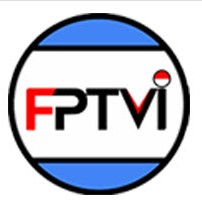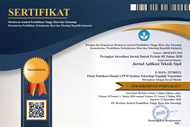Studi Pemilihan Moda Kereta Api Eksekutif Dan Kereta Api Semi Cepat Rute Jakarta-Surabaya Menggunakan Teknik Stated Preference
Abstract
The demand for railroad users, especially executive trains for the Jakarta-Surabaya route, continue to increase every year. The government planned the construction of the Jakarta-Surabaya semi-highspeed train to help the overloaded pantura lane and also as a form to modernize mass transportation. Therefore, study of mode choice between executive trains and Jakarta-Surabaya semi-highspeed train is needeed to analyze and determine the probability of passengers who are willing to shift modes. In this study, data obtained by distributing questionnaires using stated preference and processed using binary logit regression. The results reveal that highest probability occurs in the 3 times a day frequency scenario of 43.32% and for ticket prices of Rp. 900,000 of 75.08%.
Permintaan pengguna moda kereta api khususnya kereta eksekutif untuk rute Jakarta-Surabaya terus meningkat setiap tahun. Pemerintah kemudian merencanakan pembangunan Kereta Api Semi-Cepat rute Jakarta-Surabaya untuk membantu beban jalur pantura yang sudah kelebihan beban dan juga bentuk modernsisasi transportasi massal. Studi mengenai pemilihan moda antara kereta api eksekutif dan kereta api semi-cepat rute Jakarta-Surabaya perlu dilakukan untuk menganalisa dan mengetahui probabilitas penumpang yang bersedia berpindah moda. Data dalam penelitian ini didapatkan dari penyebaran kuisioner menggunakan teknik stated preference dan kemudian dianalisis menggunakan regresi logistik biner. Hasil penelitian menunjukkan probabilitas tertinggi terjadi pada skenario frekuensi 3x sehari sebesar 43,32% dan untuk harga tiket Rp.900.000,- sebesar 75,08%.Keywords
Full Text:
PDFReferences
R. R. A. Lubis and H. Widyastuti, “Penentuan Rekomendasi Standar Track Quality Index (TQI) untuk Kereta Semicepat di Indonesia (Studi Kasus : Surabaya - Cepu),” J. Apl. Tek. Sipil, vol. 18, no. 1, p. 39, 2020, doi: 10.12962/j2579-891X.v18i1.5405.
A. L. Putri and H. Widyastuti, “Study of willingness to pay the Jakarta-Bandung highspeed train: A case study of Argo Parahyangan train passangers,” IOP Conf. Ser. Mater. Sci. Eng., vol. 650, no. 1, 2019, doi: 10.1088/1757-899X/650/1/012048.
C. Román, R. Espino, and J. C. Martín, “Analyzing competition between the high speed train and alternative modes. The case of the Madrid-Zaragoza-Barcelona corridor,” J. Choice Model., vol. 3, no. 1, pp. 84–108, 2010, doi: 10.1016/S1755-5345(13)70030-7.
J. K. Lee, K. E. Yoo, and K. H. Song, “A study on travelers’ transport mode choice behavior using the mixed logit model: A case study of the Seoul-Jeju route,” J. Air Transp. Manag., vol. 56, no. Part B, pp. 131–137, 2016, doi: 10.1016/j.jairtraman.2016.04.020.
A. Y. Nurhidayat, H. Widyastuti, and D. P. Utomo, “Model of transportation mode choice between aircraft and high speed train of Jakarta-Surabaya route,” IOP Conf. Ser. Earth Environ. Sci., vol. 202, no. 1, 2018, doi: 10.1088/1755-1315/202/1/012002.
DOI: http://dx.doi.org/10.12962%2Fj2579-891X.v18i2.7395
Refbacks
- There are currently no refbacks.

Jurnal Aplikasi Teknik Sipil by Pusat Publikasi Ilmiah LPPM Institut Teknologi Sepuluh Nopember is licensed under a Creative Commons Attribution-ShareAlike 4.0 International License
Based on work at https://iptek.its.ac.id/index.php/jats
<div style="display:none;">
<p><a href="https://faciasweb.uncoma.edu.ar/">toto 777</a></p>
<p><a href="https://repositori.aks-akk.ac.id/">toto 777</a></p>
<p><a href="https://perpustakaan.aks-akk.ac.id/">toto 4d</a></p>
<p><a href="https://aks-akk.ac.id/">idnslot</a></p>
<p><a href="https://aerostreet.co.id/official-store/">barbartoto</a></p>
<p><a href="https://aerostreet.co.id/about-us/">barbartoto</a></p>
<p><a href="https://aerostreet.co.id/home/">barbartoto</a></p>
<p><a href="https://creuzaweb.uncoma.edu.ar/">slot dana</a></p>
<p><a href="https://estagios.unifatecie.edu.br/">barbartoto</a></p>
<p><a href="https://aerostreet.co.id/">barbartoto</a></p>
<p><a href="https://maissuprimentos.com/">barbartoto</a></p>
</div>




